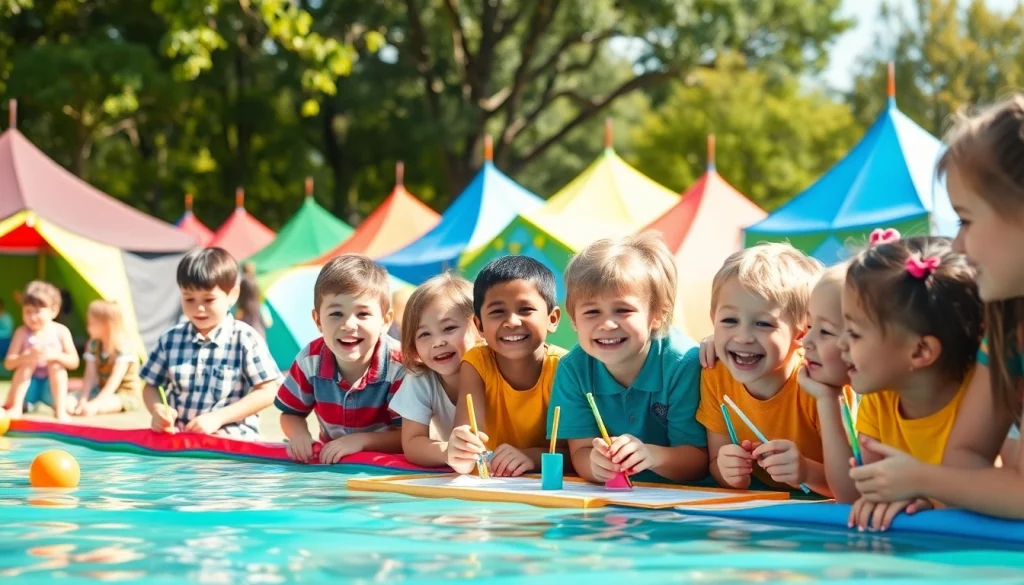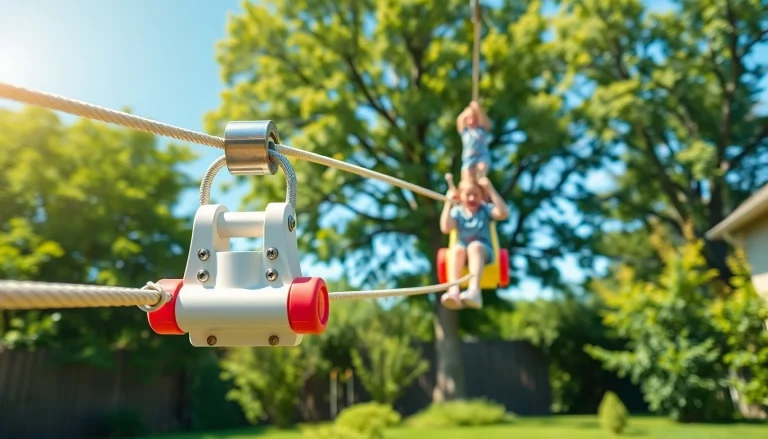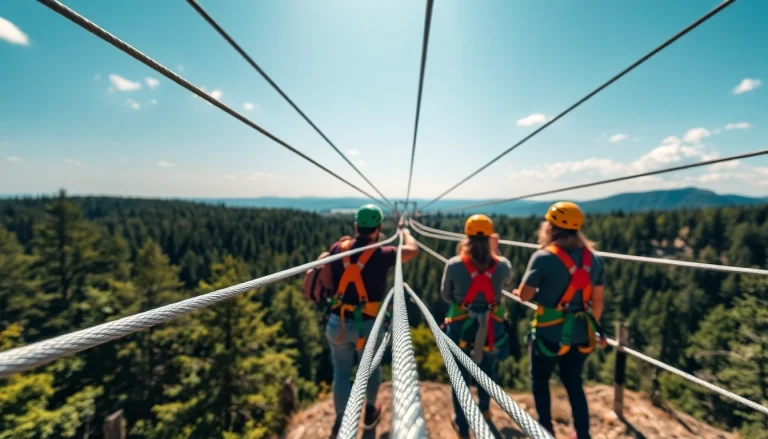
Understanding Holiday Camps
Holiday camps have become an integral part of childhood experiences for many families, offering a unique blend of adventure, learning, and social interaction. These camps provide children with opportunities to engage in various activities during school breaks, ensuring that the time away from formal education is filled with constructive and enjoyable experiences. In the UK, this concept has evolved significantly, shaped by cultural shifts and the increasing need for parents to find safe and enriching environments for their children. For families looking for options, a focus on holiday camps can lead to discovering excellent programs that suit their children’s interests and needs. Let’s explore what holiday camps are, their history, types available, and their multitude of benefits.
What Are Holiday Camps?
A holiday camp is typically a recreational facility designed for children and young people to spend quality time during school holidays. These camps can offer day-long activities, allowing parents to drop off their kids in the morning and collect them later in the day. Different camps cater to varying age groups, interests, and skill levels, ranging from sports and arts to science and adventure-themed experiences.
History and Evolution of Holiday Camps
The concept of holiday camps can be traced back to the early 20th century, with the rise of commercial camping and outdoor activities intertwined with social movements aiming to improve children’s lives. The first purpose-built holiday camps were developed in the UK, where “Butlins” established its iconic model. Notably, they catered primarily to the working-class families who sought affordable leisure activities during the holiday season.
Over the decades, holiday camps have transformed into diverse establishments, with modern camps focusing on holistic development, safety, and specialized learning. The growth of technology and changing family dynamics have also influenced how camps operate, leading them to incorporate digital learning and environmental consciousness into their curriculums. The evolution reflects both a response to societal changes and the growing desire for experiential education outside traditional classrooms.
Types of Holiday Camps Available
Holiday camps can be categorized into several types, catering to varied interests and age groups:
- Sport Camps: Focusing on athletic development, these camps offer training in sports such as soccer, basketball, swimming, and gymnastics. They often include competitions and skill-building exercises.
- Arts and Crafts Camps: These camps encourage creativity and self-expression through activities such as painting, pottery, music, and drama productions.
- Adventure Camps: For the little explorers, adventure camps include outdoor activities like hiking, rock climbing, and canoeing, allowing children to connect with nature.
- Study Camps: Tailored for academic enrichment, these camps focus on specific subjects or skills, such as STEM, languages, or coding.
- Multi-Activity Camps: Offering a combination of various activities, these camps provide flexibility for children to explore multiple interests within one program.
Benefits of Holiday Camps for Children
Enrolling children in holiday camps comes with a plethora of benefits that promote their overall development, from physical health to social and emotional growth.
Physical and Mental Health Benefits
Participation in holiday camps often results in enhanced physical fitness. Through various daily activities, children engage in exercises that promote cardiovascular health, flexibility, and strength. Activities such as swimming, hiking, and team sports not only keep kids active but also help in developing coordination and motor skills.
Beyond the physical aspects, mental health improvements are equally critical. Engaging in fun and challenging activities helps children build resilience and confidence. Moreover, camps that include mindfulness activities—such as yoga or nature walks—contribute positively to children’s psychological well-being by reducing anxiety and stress.
Social Skills Development
Holiday camps provide a unique social setting where children meet peers from different backgrounds. This exposure helps them develop crucial social skills such as teamwork, empathy, and effective communication. Participating in group activities—whether it’s sports, performances, or collaborative games—encourages children to learn how to share, resolve conflicts, and accept differing viewpoints. These experiences lay the groundwork for their future interpersonal relationships.
Opportunities for Learning and Exploration
One of the most significant advantages of holiday camps is their focus on experiential learning. Children can learn about various subjects, from science through nature-focused camps to history at heritage camps, which enrich their knowledge beyond the classroom setting.
Moreover, the exploration of different interests can help children discover new passions and talents. Whether a child develops a keen interest in painting or excels at a sport, these camps foster an environment where discovery is encouraged and celebrated.
Tips for Choosing the Right Holiday Camp
Finding a suitable holiday camp for your child can be a daunting task. Here are some tips to help parents make an informed choice.
Assessing Your Child’s Interests and Needs
The first step is understanding your child’s preferences and interests. Are they more athletic or artistic? Do they thrive in structured environments, or do they prefer more freedom? Involving your child in the decision-making process can yield better satisfaction with the camp experience.
Additionally, consider any special needs your child may have. Some camps cater to children requiring additional support, ensuring that everyone can have an enriching experience.
Evaluating Camp Safety and Accreditation
Safety is paramount when selecting a holiday camp. Investigate the camp’s safety measures, staff credentials, and emergency protocols. Accredited camps often have stringent safety guidelines, staff-to-child ratios, and regular inspections, providing parents assurance regarding their child’s safety.
It’s advisable to visit the camp beforehand, if possible, to observe the environment and facilities in person.
Reading Reviews and Testimonials
Before committing to a camp, spend time reading reviews and testimonials from other parents and children who have attended. These insights can provide valuable information regarding the camp’s quality and the experiences your child can expect. Also, do not hesitate to reach out to the camp staff with specific questions regarding their programs and policies.
Activities to Expect at Holiday Camps
The activities offered at holiday camps are diverse, aimed at keeping children engaged and excited throughout their stay. Here are common activities that are typically offered:
Arts and Crafts Workshops
Many holiday camps dedicate significant time to arts and crafts. These workshops allow children to unleash their creativity while learning new skills. From painting and sculpture to sewing and digital art, the possibilities are endless. Art activities not only provide relaxation but also help in developing fine motor skills and self-expression.
Outdoor Sports and Games
Engagement in physical activities is a cornerstone of most camps. Children can participate in traditional sports such as basketball and soccer, as well as less conventional games, which may include capture the flag, obstacle courses, and team-building exercises. These sporting activities promote teamwork, discipline, and physical fitness.
Educational Programs and Workshops
Incorporating educational elements, many camps offer workshops that align with academic standards while being fun. STEM-related activities, environmental science lessons, and coding workshops are becoming increasingly popular in holiday camps. These programs help children cultivate important skills that are highly relevant in today’s technologically-oriented society.
Preparing for a Holiday Camp
Once you’ve chosen a holiday camp, the next step is preparation. A smooth transition to camp life will significantly enhance your child’s experience.
Essential Packing Tips
When packing for camp, consider the camp’s specific requirements. Essentials typically include comfortable clothes, swim gear, sunscreen, water bottles, and a personal hygiene kit. It’s also wise to label all belongings to avoid loss. Always pack an appropriate outfit for special activities according to the camp’s schedule, whether it’s field trips or themed days.
Setting Expectations with Your Child
Explain to your child what to expect at camp, discussing the daily schedule, activities, and the importance of following camp rules. Address any worries they may have and encourage an open dialogue. Helping your child set personal goals for their time at camp can motivate them to embrace the experience fully.
Transportation and Arrival Procedures
Make sure you understand the camp’s transportation procedures. Clarify drop-off and pick-up times, and consider arranging a visit to familiarize your child with the setting. Discuss how to handle potential feelings of homesickness, ensuring your child feels supported throughout this transition.
Conclusion
In conclusion, holiday camps present a rich tapestry of experiences for children, fostering their physical, social, and emotional development. Understanding what holiday camps entail, their evolution, the benefits they offer, and how to choose and prepare for one will help parents make informed decisions that can positively shape their child’s childhood. By encouraging exploration, learning, and social interaction, holiday camps help children develop into well-rounded individuals ready to face the world with confidence.






